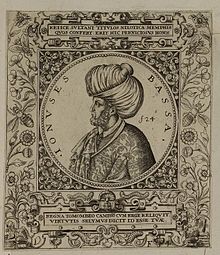Yunus Pasha
Yunus Pascha (* 15th century ; † September 13, 1517 in Tokat ) was an Ottoman statesman and Grand Vizier of the Ottoman Empire from January 30, 1517 until his death on September 30 of the same year.
Life
Yunus was of Albanian or Bulgarian origin. As part of the boys' reading he came to the Sultan's Palace in Istanbul, converted to Islam and attended the Enderun Palace School. Yunus started with a job at Defterdar and acted as Kapıcıbaşı . From 1505 he belonged to the Janissaries and possibly also became Ağa (Supreme Commander) of the Janissaries Corps. He experienced the earthquake in Istanbul in 1509 and was probably involved in the reconstruction of the city. In 1511 he was vizier at the Sublime Porte and Beylerbey (provincial governor) of Eyâlet Anatolia .
Yunus Pascha played an important role in the Ottoman Mamluk War (1516-1517) . After the Ottoman victory in the Battle of Marj Dabiq in 1516, Yunus Pasha mobilized his troops as commander-in-chief and conquered Aleppo , and then the cities of Hama , Homs and Damascus in quick succession . After the battle of Raydaniyya , Yunus marched to Cairo and took the city after a three-day siege with his janissaries for the Ottoman Empire.
Due to his successes and the death of the Grand Vizier Hadım Sinan Pasha in battle during the Battle of Raydaniyya on January 22, 1517, Yunus Pasha was appointed Grand Vizier of the Ottoman Empire eight days later, on January 30. Shortly afterwards he also became governor of Egypt. After Yunus Pasha held these dual positions, he allegedly founded a syndicate of bribery and extortion. After news of corruption had reached the Sultan, Selim I revoked the appointment to the governor's office and transferred it to Hayır Bey , so that Yunus Pasha remained only the office of grand vizier.
It is believed that Sultan Selim I had Yunus Pasha executed for angry protesting against Hayır Bey's promotion to governor of Egypt. The reason for this could have been the ethnic affiliation of the successor, but also bitterness that Yunus Pascha had lost his governorate, although he was the one who had conquered Egypt for the Ottoman Empire. Whatever the reason, Yunus Pasha was executed by beheading on September 13, 1517.
Web links
Individual evidence
- ↑ a b c Omer Mahir Alpe: Yunus Paşa . In: Yaşamları ve Yapıtlarıyla Osmanlılar Ansiklopedisi . Volume 2, Yapı Kredi Kültür Sanat Yayıncılık A.Ş., Istanbul 1999, p. 678, ISBN 975-08-0072-9
- ↑ a b Yûnus Paşa , İslâm Ansiklopedisi, Türk Diyanet Vakfı, accessed on May 11, 2020
- ^ Mehmet Süreyya: Sicill-i Osmanî . Volume 5, Türkiye Kültür Bakanlığı and Türkiye Ekonomik ve Toplumsal Tarih Vakfı, Istanbul 1996, p. 1685
- ↑ a b İsmail Hakkı Uzunçarşılı : Osmanlı Tarihi . Volume 2, Türk Tarih Kurumu Yayınları, Istanbul 2011, pp. 286, 291, 543, 544
| predecessor | Office | successor |
|---|---|---|
| Hadım Sinan Pasha |
Grand Vizier of the Ottoman Empire January 30, 1517 - September 13, 1517 |
Piri Mehmed Pasha |
| personal data | |
|---|---|
| SURNAME | Yunus Pasha |
| ALTERNATIVE NAMES | Yunus Paşa (Turkish) |
| BRIEF DESCRIPTION | Ottoman statesman, governor and grand vizier |
| DATE OF BIRTH | 15th century |
| DATE OF DEATH | September 13, 1517 |
| Place of death | Tokat |
